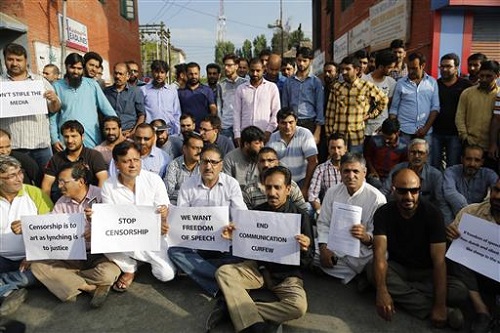Washington, July 18, 2016–The Committee to Protect Journalists calls on authorities in the northern Indian state of Jammu and Kashmir to stop harassing and obstructing the media. Several newspapers in the state have been prevented from publishing for three days, while mobile internet services are shut down, and cable television has been blocked.
Police raided newspaper offices in Srinagar early on the morning of July 16, halting printing presses, confiscating printed papers due for delivery, and briefly detaining printing and delivery staff, according to local news reports. Publications including Greater Kashmir, Rising Kashmir, Daily Kashmir Images, Kashmir Observer, and Kashmir Reader have been affected. Although many publications have been able to continue online operations, mobile internet services in the region have been shut down by authorities since July 8, making it harder for readers to access current and accurate information, according to the news reports.
Authorities also blocked cable television on July 16, reports said. CPJ was unable to determine whether it has been restored.
“The Indian government should immediately lift its ban on newspaper operations and restore the free flow of information,” said Steven Butler, CPJ’s Asia program coordinator. “It’s obvious that Kashmir’s longstanding difficulties have nothing to do with the operation of a free press, and that preventing professional journalists from doing their jobs can only make the situation worse.”
The crackdown on the press follows a period of unrest in Kashmir, marked by the July 8 killing of separatist leader Burhan Wani. Protesters have defied a curfew imposed by authorities, and daily clashes with police have left at least 39 people dead, according to national news reports. State Education Minister Naeem Akhtar was quoted as saying the measures blocking the press were aimed at saving lives and strengthening peace efforts.
Newspaper editors and owners met on Saturday night to draw up plans to counter the ban, the newspapers reported. An editorial in the Kashmir Times defended the industry, saying, “to have considered the media a threat to peace is ridiculous.” Instead, the paper argued, the press ban opened the door to rumors by unscrupulous players.
